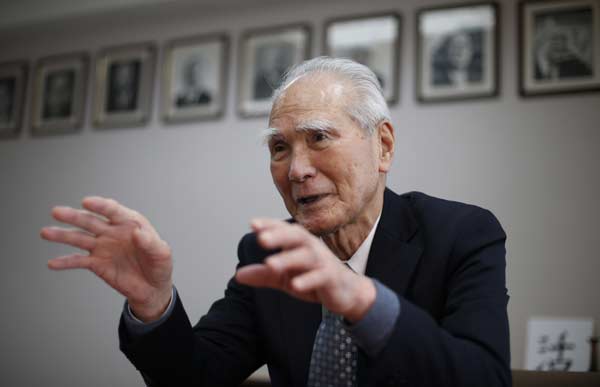Abe playing tricky game with WWII
Updated: 2015-03-14 08:18
By Wang Ping(China Daily)
|
||||||||
 |
|
Former Japanese Prime Minister Tomiichi Murayama speaks in front of portraits of former leaders of his Social Democratic Party during an interview with Reuters at the party headquarters in Tokyo March 10, 2015. [Photo/Agencies] |
As the world prepares to commemorate the 70th anniversary of the victory against fascist forces in World War II and the triumph of the Chinese people in the War of Resistance Against Japanese Aggression (1937-45), the spotlight will be on former fascist powers, especially Japan, and their attitude toward their war crimes.
In a statement issued on Aug 15, 1995, half a century after the end of WWII, then Japanese prime minister Tomiichi Murayama expressed deep remorse over Japan's wartime invasion of and atrocities committed on neighboring countries. He said mutual trust and understanding between Japan and its Asian neighbors were vital to forge a stable Asia-Pacific region and a peaceful world.
Moreover, Murayama admitted that Japan's decision to wage a series of wars was wrong, which caused nothing but misery to the people in the victim countries, including China and the Republic of Korea.
Murayama's apology, known as the "Murayama Statement", not only helped improve Japan's relations with its neighbors, but also set a good example for his successors to follow.
But even before taking office for the second time as Japan's prime minister at the end of 2012, Shinzo Abe began his attempt to whitewash his country's history of war crimes.
To garner support for his Liberal Democratic Party in the 2012 election, Abe declared in his election manifesto that, if elected, he would improve standards for textbook censorship by revising the clauses that require Japan to respect the sentiments of its Asian neighbors. His move was an open challenge to Kiichi Miyazawa, who as Japan's chief cabinet secretary in 1982 had pushed for the implementation of the clauses.
- Global health entering new era: WHO chief
- Brazil's planning minister steps aside after recordings revelation
- Vietnam, US adopt joint statement on advancing comprehensive partnership
- European border closures 'inhumane': UN refugee agency
- Japan's foreign minister calls A-bombings extremely regrettable
- Fukushima impact unprecedented for oceans: US expert

 Stars of Lijiang River: Elderly brothers with white beards
Stars of Lijiang River: Elderly brothers with white beards
 Wealthy Chinese children paying money to learn British manners
Wealthy Chinese children paying money to learn British manners
 Military-style wedding: Fighter jets, grooms in dashing uniforms
Military-style wedding: Fighter jets, grooms in dashing uniforms
 Striking photos around the world: May 16 - May 22
Striking photos around the world: May 16 - May 22
 Robots help elderly in nursing home in east China
Robots help elderly in nursing home in east China
 Hanging in the air: Chongqing holds rescue drill
Hanging in the air: Chongqing holds rescue drill
 2.1-ton tofu finishes in two hours in central China
2.1-ton tofu finishes in two hours in central China
 Six things you may not know about Grain Buds
Six things you may not know about Grain Buds
Most Viewed
Editor's Picks

|

|

|

|

|

|
Today's Top News
Liang avoids jail in shooting death
China's finance minister addresses ratings downgrade
Duke alumni visit Chinese Embassy
Marriott unlikely to top Anbang offer for Starwood: Observers
Chinese biopharma debuts on Nasdaq
What ends Jeb Bush's White House hopes
Investigation for Nicolas's campaign
Will US-ASEAN meeting be good for region?
US Weekly

|

|







